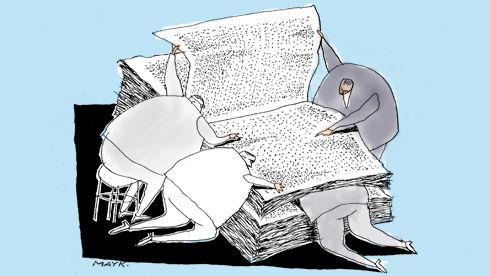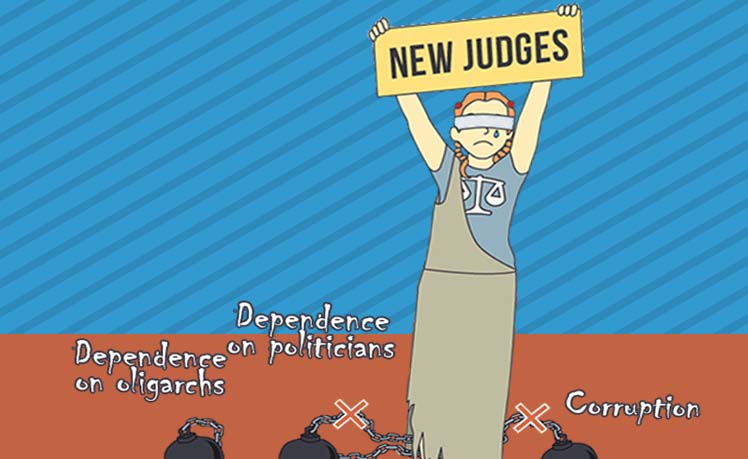It is a sad fact that government without a capable, professional and impartial administrative bureaucracy is highly unlikely to become a stable and prosperous democracy.
Sadly, the Ukrainian civil service remains bloated and largely discredited in the eyes of the people. In the World Bank’s 2013 Government Effectiveness Index, Ukraine ranked a dismal. The government bureaucracy is too large, heavily politicized, corrupt and insufficiently meritocratic.
In the past Ukrainian political parties would bribe top bureaucrats in order to gain control of large state financial streams. In fact, public procurement is the most problematic sector and one government procurement expert at Transparency International Ukraine stated that “the level of corruption in a tender can be up to 40 to 50 percent”.
Arseniy Yatsenyuk who has recently resigned from the prime minister position, has reported that Ukraine’s government makes about $25 billion in state purchases annually, 40 percent of which — or $10 billion — is lost through graft. However, contrary to popular perceptions, several important civil service reforms have been enacted since Euromaidan and although many of them have yet to take effect, their very existence gives cause for hope.
In fact, three main factors encourage cautious optimism with regard to Ukraine’s bureaucratic reforms.
Firstly, in the aftermath of the Revolution many talented individuals who formerly worked in the private sector or abroad accepted positions in the government and civil service. The former President of Georgia, Mikheil Saakashvili, became governor of Odesa and has since loudly trumpeted the necessity of reform.
Saakashvili brought several other Georgians with him, perhaps most notably Eka Zguladze who has been one of the key architects of Ukraine’s successful police reform and Minister of Health Alexander Kvitashvili. Moreover, the American born Natalie Jaresko and Lithuanian born Aivaras Abromavičius were widely acclaimed for their work to stabilise the economy, although the latter’s resignation seems to have sparked the crisis. Nevertheless, the presence of these untainted and western-educated reformers can only be a boon to Ukraine in its hour of need.
Secondly, the role of foreign donors in Ukraine’s attempted transition has been unprecedented. European countries have been involved in a vast array of technical assistance and civil society projects in every sphere of government and society.
The US, EU, IMF, World Bank and even Japan have joined forces to give Ukraine a $40 billion four-year financial support package. These international lenders are starting to exert pressure to coax further reforms from Poroshenko and hopefully a combination of carrot and stick will induce greater efforts from the government. Moreover, European countries are ideally placed to advise Ukraine on reforming its civil service. If there is one thing the EU does well it is bureaucracy and the alliance has built up a deep well of experience in helping former Soviet countries transform and eventually attain membership.
Thirdly, civil society has been irrevocably truly mobilized and many groups like Transparency International and the Anti-Corruption Action Centre are driving for reform helping ‘to maintain momentum’ and keeps pressure on the government. A third of members on a new commission to appoint civil servants will be civil society activists and their influence can be felt in many to other projects besides.
All of this bodes well for civil service reform and a crucial new law was recently passed to much acclaim. Bureaucratic appointments will no longer be divided between political parties under a quota system, but made via transparent competition. Membership of political parties for top civil servants will be prohibited, helping to depoliticize their work. Senior bureaucrats’ tenures will now be limited to a maximum of two five-year terms, whereas in the past they were lifetime appointments. The number of civil servants is also expected to be reduced by two thirds which should increase pay and the calibre of those employed. Finally, bonuses will now account for only 30% of salary whereas in the past they were 70-80% making bureaucrats beholden to their political masters.
Thus, the burgeoning civil service reform effort is promising and although it has taken some time, it seems to be yielding real results.

Related:
- Revitalized and energized: Ukraine’s energy reform success | #UAreforms
- Old faces in courts endanger all Ukrainian reforms | #UAreforms
- Mixed expectations for Ukraine’s new government | #UAreforms
- Ukraine’s judicial reform: plus ça change | #UAreforms
- Making a miracle: Ukraine’s untapped economic potential | #UAreforms
- Why Ukraine needs a technocratic government | #UAreforms
- Oligarchs: good old buddies who own Ukraine | #UAreforms






